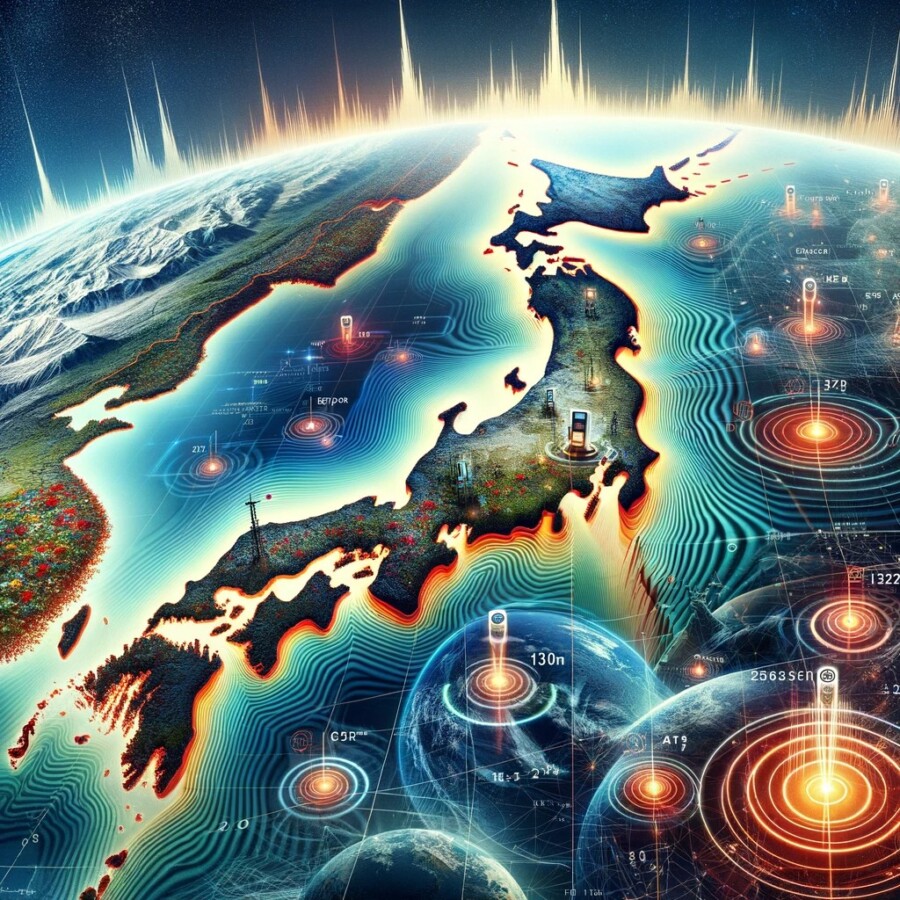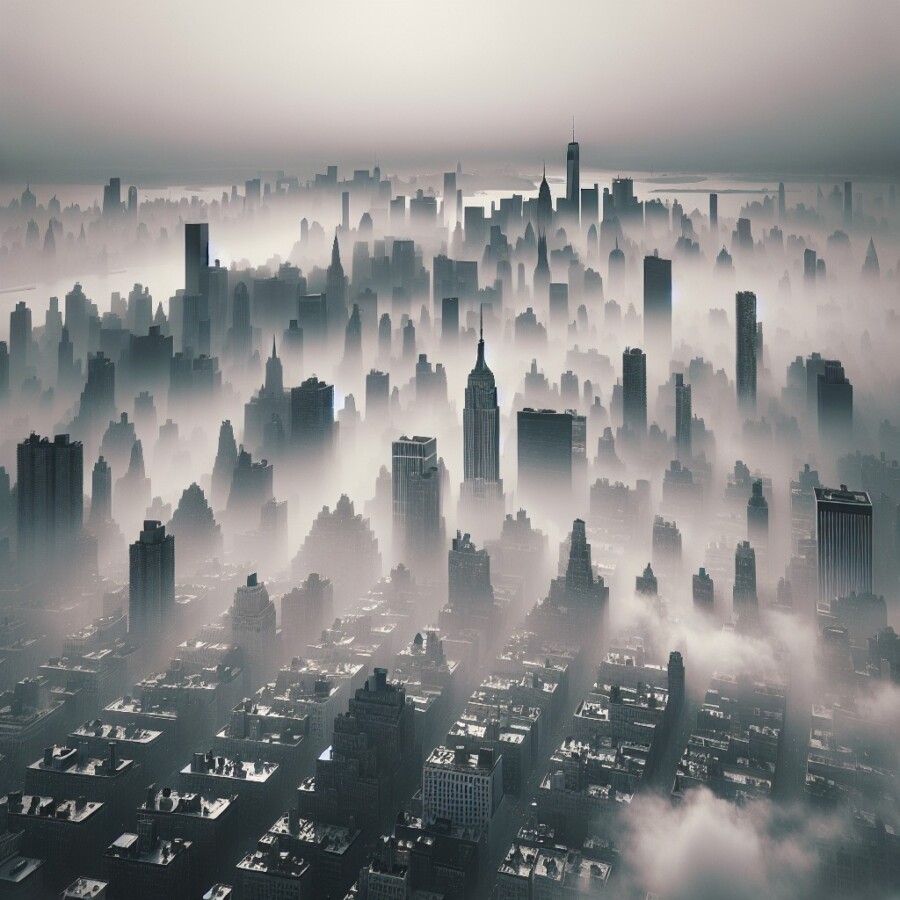Japan is used to having big earthquakes, and the recent one was a big one. Japan has a bunch of GPS stations all over the country that can measure how much the ground moves during an earthquake. In this earthquake, the ground moved as much as 130cm to the west. Pictures taken from space also show that the ground went up because of the earthquake.
One good thing about the ground moving was that it made the tsunami waves smaller when they hit the coast. Even though the earthquake caused a lot of damage, not many people died compared to other countries. Japan is ready for earthquakes and has good buildings and people who know what to do during one. Japan also has a really good warning system that tells people on TV, radio, and cell phones when an earthquake is coming.
Scientists can’t tell when or how big an earthquake will be, but Japan’s warning system gives people a few seconds to get ready before the shaking starts. This helps with important things like stopping trains and opening doors at fire stations. People in Japan are also taught to “drop, cover, and hold on” during an earthquake. Because Japan is ready for earthquakes, not as many people get hurt compared to other places that have had big earthquakes.
Original news source: How Japan’s big quake shifted the land (BBC)
🎧 Listen:
Slow
Normal
Fast
📖 Vocabulary:
| 1 | earthquakes | Natural disasters involving the ground shaking violently |
| 2 | GPS | A system that uses satellites to find out where something is on Earth |
| 3 | measure | To find out the size, length, or amount of something |
| 4 | tsunami | Huge sea waves caused by underwater earthquakes or other disturbances |
| 5 | coast | The part of the land that is close to the sea |
| 6 | damage | Harm or destruction caused by something bad |
| 7 | buildings | Structures like houses, offices, and schools where people live, work, or learn |
| 8 | system | A set of connected parts that work together to do a job |
| 9 | warning | Alerts or signals that tell people about possible danger |
| 10 | scientists | People who study the natural world and try to understand how it works |
| 11 | seconds | Very short periods of time |
| 12 | shaking | Moving back and forth or up and down quickly |
| 13 | trains | Vehicles that run on tracks and carry people or goods |
| 14 | stations | Places where certain activities happen, like where trains stop or where firefighters keep their trucks |
| 15 | taught | Instructed or given information on how to do something |
Group or Classroom Activities
Warm-up Activities:
– Charades
Instructions: Divide the class into small groups. Give each group a keyword related to the article (e.g. earthquake, tsunami, warning system). Each group must take turns acting out the keyword without using any words or sounds. The other groups have to guess the keyword within a certain time limit. The group that guesses correctly earns a point.
– News Summary
Instructions: Divide the class into pairs. Each pair must read the article and then write a summary of the main points in their own words. After a few minutes, have pairs share their summaries with the rest of the class. Encourage discussion and clarification of any misunderstood points.
– Opinion Poll
Instructions: Create a list of statements related to the article (e.g. “Japan’s warning system is effective”, “Earthquakes are natural disasters that cannot be prevented”). Have students individually rate their agreement with each statement on a scale of 1 to 5. Then, pair up students and have them discuss their ratings, explaining their reasons and trying to convince their partner to change their rating if they disagree.
– Vocabulary Pictionary
Instructions: Prepare a list of vocabulary words from the article (e.g. earthquake, tsunami, ground, damage). Divide the class into two teams. One person from each team takes turns drawing a word on the board while their team tries to guess the word within a certain time limit. The team that guesses correctly earns a point.
– Pros and Cons
Instructions: Divide the class into small groups. Give each group a topic related to the article (e.g. earthquake preparedness, warning systems). Each group must discuss the pros and cons of the topic and write them down. After a few minutes, have groups share their points with the rest of the class and facilitate a class discussion on the different perspectives.
🤔 Comprehension Questions:
1. How does Japan measure how much the ground moves during an earthquake?
2. What evidence from space shows that the ground moved during the recent earthquake in Japan?
3. How did the movement of the ground during the earthquake affect the size of the tsunami waves?
4. Why did the recent earthquake in Japan cause less deaths compared to other countries?
5. What warning system does Japan have in place to alert people about an incoming earthquake?
6. Can scientists predict when or how big an earthquake will be?
7. How does Japan’s warning system help people prepare for an earthquake?
8. What are people in Japan taught to do during an earthquake to stay safe?
Go to answers ⇩
🎧✍️ Listen and Fill in the Gaps:
Japan is used to having big (1)______, and the recent one was a big one. Japan has a bunch of GPS stations all over the country that can measure how much the ground moves during an (2)______. In this earthquake, the ground (3)______ as much as 130cm to the west. (4)______ taken from space also show that the ground went up because of the earthquake.
One good thing about the (5)______ moving was that it made the tsunami waves smaller when they hit the coast. Even though the earthquake (6)______ a lot of (7)______, not many people died (8)______ to other countries. Japan is ready for earthquakes and has good buildings and (9)______ who know what to do during one. Japan also has a really good warning (10)______ that (11)______ people on TV, radio, and cell phones when an earthquake is (12)______.
Scientists can’t tell when or how big an earthquake will be, but Japan’s warning system gives people a few seconds to get ready before the shaking starts. This (13)______ with (14)______ things like stopping trains and opening doors at fire (15)______. (16)______ in Japan are also taught to “drop, cover, and hold on” during an earthquake. Because Japan is ready for earthquakes, not as many people get hurt compared to other places that have had big earthquakes.
Go to answers ⇩
💬 Discussion Questions:
Students can ask a partner these questions, or discuss them as a group.
1. What is a GPS station and what does it do during an earthquake?
2. How would you feel if you experienced a big earthquake like the one in Japan?
3. Do you think it’s important for a country to be prepared for earthquakes? Why or why not?
4. Have you ever experienced an earthquake? If so, what was it like?
5. What do you think are some important things to do during an earthquake?
6. How do you think Japan’s warning system helps during an earthquake?
7. Do you think it’s better to have a warning system that gives a few seconds of preparation or one that gives more time? Why?
8. Why do you think Japan’s buildings are able to withstand earthquakes better than buildings in other countries?
9. Would you feel safer living in a country with a good warning system for earthquakes? Why or why not?
10. How do you think the ground moving during an earthquake can affect the size of tsunami waves?
11. What do you think are some challenges of predicting earthquakes?
12. Do you like the idea of having a warning system that sends alerts to your phone during an earthquake? Why or why not?
13. How do you think the “drop, cover, and hold on” technique can help during an earthquake?
14. Do you think other countries should learn from Japan’s preparedness for earthquakes? Why or why not?
15. Why do you think Japan has a history of experiencing big earthquakes?
Individual Activities
📖💭 Vocabulary Meanings:
Match each word to its meaning.
Words:
1. earthquakes
2. GPS
3. measure
4. tsunami
5. coast
6. damage
7. buildings
8. system
9. warning
10. scientists
11. seconds
12. shaking
13. trains
14. stations
15. taught
Meanings:
(A) Instructed or given information on how to do something
(B) Harm or destruction caused by something bad
(C) Huge sea waves caused by underwater earthquakes or other disturbances
(D) Very short periods of time
(E) A system that uses satellites to find out where something is on Earth
(F) Places where certain activities happen, like where trains stop or where firefighters keep their trucks
(G) People who study the natural world and try to understand how it works
(H) Moving back and forth or up and down quickly
(I) Vehicles that run on tracks and carry people or goods
(J) Structures like houses, offices, and schools where people live, work, or learn
(K) To find out the size, length, or amount of something
(L) Natural disasters involving the ground shaking violently
(M) A set of connected parts that work together to do a job
(N) Alerts or signals that tell people about possible danger
(O) The part of the land that is close to the sea
Go to answers ⇩
🔡 Multiple Choice Questions:
1. What do the GPS stations in Japan measure during an earthquake?
(a) How loud the earthquake is
(b) How much the ground moves
(c) How many people are affected
(d) How long the earthquake lasts
2. How much did the ground move during the recent earthquake in Japan?
(a) 100cm to the east
(b) 50cm to the north
(c) 130cm to the west
(d) 80cm to the south
3. What effect did the ground moving have on the tsunami waves?
(a) Made them bigger
(b) Made them faster
(c) Made them slower
(d) Made them smaller
4. How does Japan’s warning system help during an earthquake?
(a) It gives people a few seconds to get ready
(b) It predicts when and how big an earthquake will be
(c) It stops the shaking before it starts
(d) It tells people to evacuate immediately
5. What are people in Japan taught to do during an earthquake?
(a) “Run, hide, and scream”
(b) “Drop, cover, and hold on”
(c) “Jump, shout, and run away”
(d) “Stand still and wait”
6. Why do fewer people get hurt in Japan during earthquakes compared to other places?
(a) Japan is ready for earthquakes with good buildings and prepared people
(b) Japan has fewer earthquakes than other places
(c) Japan has a stronger warning system than other places
(d) Japan has better emergency services than other places
7. What do pictures taken from space show about the recent earthquake in Japan?
(a) The ground went down
(b) The ground didn’t move
(c) The ground went up
(d) The ground cracked
8. What does the article say about Japan’s experience with earthquakes?
(a) Japan has never experienced earthquakes before
(b) Japan is not prepared for earthquakes
(c) Japan doesn’t have a warning system for earthquakes
(d) Japan is used to having big earthquakes
Go to answers ⇩
🕵️ True or False Questions:
1. Satellite images show that the ground in Japan rose due to the earthquake.
2. The movement of the ground during the earthquake worsened the size of the tsunami waves when they reached the coast.
3. Japan has a network of GPS stations that can measure the movement of the ground during an earthquake.
4. Japan is ill-prepared for earthquakes, with fragile buildings and uninformed individuals who have no idea how to respond during such events.
5. The recent earthquake in Japan caused the ground to move as much as 130cm to the west.
6. Despite causing damage, the earthquake resulted in fewer casualties compared to other countries.
7. Japan has an ineffective warning system that fails to alert people through TV, radio, and cell phones before an earthquake occurs.
8. Japan experiences rare earthquakes, and the recent one was particularly insignificant.
Go to answers ⇩
📝 Write a Summary:
Write a summary of this news article in two sentences.
Check your writing now with the best free AI for English writing!
Writing Questions:
Answer the following questions. Write as much as you can for each answer.
Check your answers with our free English writing assistant!
1. What are GPS stations used for in Japan during earthquakes?
2. How did the ground movement during the recent earthquake in Japan affect the size of the tsunami waves?
3. Why did not many people die in Japan compared to other countries during the recent earthquake?
4. How does Japan’s warning system help people prepare for an earthquake?
5. What are some of the things people in Japan are taught to do during an earthquake?
✅ Answers
🤔✅ Comprehension Question Answers:
1. How does Japan measure how much the ground moves during an earthquake?
Japan uses GPS stations all over the country to measure how much the ground moves during an earthquake.
2. What evidence from space shows that the ground moved during the recent earthquake in Japan?
Pictures taken from space show that the ground went up because of the earthquake.
3. How did the movement of the ground during the earthquake affect the size of the tsunami waves?
The movement of the ground made the tsunami waves smaller when they hit the coast.
4. Why did the recent earthquake in Japan cause fewer deaths compared to other countries?
Japan is ready for earthquakes and has good buildings and people who know what to do during one.
5. What warning system does Japan have in place to alert people about an incoming earthquake?
Japan has a warning system that tells people on TV, radio, and cell phones when an earthquake is coming.
6. Can scientists predict when or how big an earthquake will be?
Scientists cannot predict when or how big an earthquake will be.
7. How does Japan’s warning system help people prepare for an earthquake?
Japan’s warning system gives people a few seconds to get ready before the shaking starts, allowing them to take necessary precautions such as stopping trains and opening doors at fire stations.
8. What are people in Japan taught to do during an earthquake to stay safe?
People in Japan are taught to “drop, cover, and hold on” during an earthquake to stay safe.
Go back to questions ⇧
🎧✍️✅ Listen and Fill in the Gaps Answers:
(1) earthquakes
(2) earthquake
(3) moved
(4) Pictures
(5) ground
(6) caused
(7) damage
(8) compared
(9) people
(10) system
(11) tells
(12) coming
(13) helps
(14) important
(15) stations
(16) People
Go back to questions ⇧
📖💭✅ Vocabulary Meanings Answers:
1. earthquakes
Answer: (L) Natural disasters involving the ground shaking violently
2. GPS
Answer: (E) A system that uses satellites to find out where something is on Earth
3. measure
Answer: (K) To find out the size, length, or amount of something
4. tsunami
Answer: (C) Huge sea waves caused by underwater earthquakes or other disturbances
5. coast
Answer: (O) The part of the land that is close to the sea
6. damage
Answer: (B) Harm or destruction caused by something bad
7. buildings
Answer: (J) Structures like houses, offices, and schools where people live, work, or learn
8. system
Answer: (M) A set of connected parts that work together to do a job
9. warning
Answer: (N) Alerts or signals that tell people about possible danger
10. scientists
Answer: (G) People who study the natural world and try to understand how it works
11. seconds
Answer: (D) Very short periods of time
12. shaking
Answer: (H) Moving back and forth or up and down quickly
13. trains
Answer: (I) Vehicles that run on tracks and carry people or goods
14. stations
Answer: (F) Places where certain activities happen, like where trains stop or where firefighters keep their trucks
15. taught
Answer: (A) Instructed or given information on how to do something
Go back to questions ⇧
🔡✅ Multiple Choice Answers:
1. What do the GPS stations in Japan measure during an earthquake?
Answer: (b) How much the ground moves
2. How much did the ground move during the recent earthquake in Japan?
Answer: (c) 130cm to the west
3. What effect did the ground moving have on the tsunami waves?
Answer: (d) Made them smaller
4. How does Japan’s warning system help during an earthquake?
Answer: (a) It gives people a few seconds to get ready
5. What are people in Japan taught to do during an earthquake?
Answer: (b) “Drop, cover, and hold on”
6. Why do fewer people get hurt in Japan during earthquakes compared to other places?
Answer: (a) Japan is ready for earthquakes with good buildings and prepared people
7. What do pictures taken from space show about the recent earthquake in Japan?
Answer: (c) The ground went up
8. What does the article say about Japan’s experience with earthquakes?
Answer: (d) Japan is used to having big earthquakes
Go back to questions ⇧
🕵️✅ True or False Answers:
1. Satellite images show that the ground in Japan rose due to the earthquake. (Answer: True)
2. The movement of the ground during the earthquake worsened the size of the tsunami waves when they reached the coast. (Answer: False)
3. Japan has a network of GPS stations that can measure the movement of the ground during an earthquake. (Answer: True)
4. Japan is ill-prepared for earthquakes, with fragile buildings and uninformed individuals who have no idea how to respond during such events. (Answer: False)
5. The recent earthquake in Japan caused the ground to move as much as 130cm to the west. (Answer: True)
6. Despite causing damage, the earthquake resulted in fewer casualties compared to other countries. (Answer: True)
7. Japan has an ineffective warning system that fails to alert people through TV, radio, and cell phones before an earthquake occurs. (Answer: False)
8. Japan experiences rare earthquakes, and the recent one was particularly insignificant. (Answer: False)
Go back to questions ⇧















